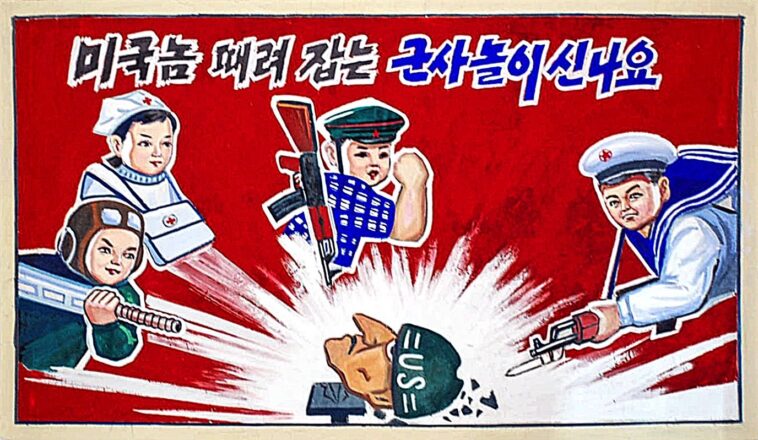
On the TV show Archer, when North Korean agents capture the main character, international spy Sterling Archer, they announce, “We take you back to glorious Democratic People’s Republic of Korea.” Archer shoots back, “It’s not democratic, not a republic, and definitely not glorious.” Sometimes, cartoons tell the truth better than the news, because in that one line, he nailed North Korea.
North Korea is preparing an elaborate celebration for the 80th anniversary of the ruling Workers’ Party of Korea this week. Ahead of the anniversary, Kim Jong Un delivered a sweeping ideological address at the Party Founding Museum in Pyongyang, emphasizing absolute loyalty, discipline, and obedience within the ruling elite.
In his speech, Kim praised his grandfather and state founder, Kim Il Sung, who, he said, laid the “solid cornerstone” of the nation’s enduring strength. He urged the current generation to renew its “revolutionary obligations and duties” to complete the socialist cause begun by their predecessors. He described the Workers’ Party as the embodiment of “people-centered socialism,” rooted in self-reliance and Juche, the failed social and economic system invented by his grandfather.
During eight decades and three generations of Kim family rule, Kim Il Sung, his son Kim Jong Il, and his grandson Kim Jong Un, the regime has failed to improve the lives of its people. The nation of 26.5 million remains among the poorest on Earth, with an estimated average annual income between 790 and 900 U.S. dollars. Around 60 percent of North Koreans were believed to be living in extreme poverty as of 2018, and less than 55 percent of the population had access to electricity in 2022.
The regime’s long record of economic mismanagement has led to chronic hunger and malnutrition. During the 1990s famine, between 240,000 and 3.5 million people are estimated to have died of starvation or hunger-related illness, with deaths peaking in 1997. Even today, chronic malnutrition remains at a “medium” level nationwide.
North Korean children remain significantly smaller and lighter than their South Korean counterparts. Pre-school children are up to 5 inches (13 centimeters) shorter and 15 pounds (7 kilograms) lighter. In 1998, the average North Korean child was already 2 to 3 inches (6–7 centimeters) shorter and 7 pounds (3 kilograms) lighter than a South Korean child, and the gap persisted in later years. The average 17-year-old boy in South Korea now stands about 5 feet 8 inches (173 centimeters) tall, while most North Korean teenagers measure under 5 feet (152 centimeters) and weigh less than 100 pounds (45 kilograms).
Beyond material deprivation, North Koreans live under one of the most repressive governments in the world. The country scored just 3 out of 100 on Freedom House’s 2025 “Freedom in the World” index, zero for political rights and three for civil liberties. It remains a one-party state ruled by a dynastic, totalitarian dictatorship that engages in grave human rights abuses. Surveillance is pervasive, arbitrary arrests are common, and punishments for political offenses are severe.
Nearly all forms of communication are monitored through a vast informant network. About 7 million people own government-approved smartphones and use state-run mobile service, which connects to a closed internal intranet rather than the global internet. These phones function as surveillance tools, allowing authorities to review app usage, browsing history, and even take screenshots remotely.
Roughly 20 percent of the population uses the intranet Wi-Fi system called Mirae. Accessing foreign media, unregistered devices, or unsanctioned broadcasts is illegal and classified as “anti-socialist behavior,” punishable by imprisonment, torture, or forced labor.
From the age of seven, citizens are forced into state organizations and subjected to continuous ideological control. The regime maintains a vast system of political prison camps where torture, forced labor, and starvation are routine. Travel outside the country is tightly restricted, and communication with the outside world is nearly impossible.
North Korea’s government enforces obedience through fear, indoctrination, and violence, ensuring that even after 80 years, the country remains frozen in the same totalitarian grip that began with its founding.
North Korea enforces one of the world’s harshest conscription systems: virtually all men are drafted around age 17 for 10–13 years, while selected women serve about seven years, with almost no exemptions. Conditions are notoriously grim, rations are scarce, malnutrition is common, and troops often forage or steal food to survive.
Daily life combines punishing discipline with heavy manual labor on construction and infrastructure projects, constant surveillance, and ideological indoctrination, with little contact with family or outside information. The decade-plus commitment erases young adulthood, derailing education, careers, and family formation. In practice, conscription functions as state control and forced labor under a military label.
In his speech ahead of the grand celebration of the so-called “miraculous workers’ utopia” built by three generations of his family, Kim Jong Un portrayed the Workers’ Party as the nation’s “political General Staff,” asserting its exclusive authority over all aspects of national life, much like a military command defending state sovereignty. He warned officials to display total obedience to his orders and to serve only the party’s interests. Pledging to tighten control, Kim vowed to “transform” North Korea within the next ten years through comprehensive socialist development.
Basically, his message was that through the same failed system that made everyone poor and suffering, he would somehow transform the country, though into what, he didn’t say.



